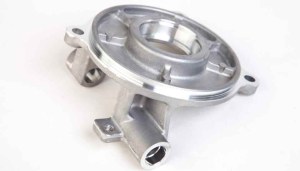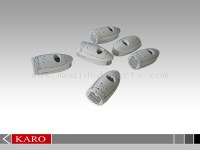Investment casting, also called the lost-wax casting process, is actually an ancient metal casting technology with a history of over 6,000 years. It generally refers to the mold made by meltable materials (such as wax, plastic, etc.) in very accurate dimensions. The mold is applied to several layers of refractory coating, then heat it to create a solid and hard shell over the mold. The further step is to heat it at a very high temperature, so as to melt the inner mold so that let the fire-resistant shell left. All these processes together we call them "molding", it describes the basic method to make the shell that we desired for the next casting works.
After making the shell, the next casting works is similar to normal sand casting. Pouring the melted metal into the shell, wait until the casting part cooling down. Then break the shell to acquire the finished part.
The Advantages of Investment Casting
1.The investment casting is suitable to make the complicated structure product, especially to produce high-temperature resistant alloy parts. An extraordinary example is manufacturing the fan blade of the air engine. Its streamlined shape and inner chamber make the traditional machining process incapable to form a shape. However, by using investment casting technology, this kind of part can achieve mass production, which product consistency is approved as well.
2.The investment casting is able to reach casting accuracy CT4~6 (while the sand casting is CT10~13, and the die casting is CT5~7). however, there are a number of factors that will affect the accuracy of the finished product, including the shrink of mold, the deform of the shell during heating and cooling, the deform of investment casting part during solidifying, etc. Therefore, an experienced engineer will pre-calculate these factors and adjust the dimensions of the investment casting mold or take measures to reduce the negative effects.
3. During the molding process, the investment casting mold made by wax or plastic has a fine surface finish. Furthermore, since the shell is produced by the composite of high-temperature-resistant materials and fire-resistant adhesives, the shell inner surface which is directly contacting the melted metal has quite a high-quality finish. As a result, the investment casting can reach a high surface finish roughness Ra.1.6~3.2μm.
4. Even though the investment casting parts are generally small, some of the advanced foundries can produce the casting with every single piece weighing over 500 kg. Meanwhile, this relatively large investment in casting requires more experienced engineers and casting operation teams in handling.
Manufacture of Investment Casting
The first process of investment casting production is the manufacture of the investment casting mold, which is used to form the model of the cavity in the refractory shell, so to obtain castings with high dimensional accuracy and surface finish. In addition, the performance of the investment casting mold itself should make the subsequent processes such as shell making as easy as possible. In order to get the above high-quality requirements of the investment casting mold, in addition to a good press (press molten die mold), but also must choose the appropriate investment casting materials (referred to as mold material) and reasonable mold making process.
Most of the production uses pressure to press the paste mold material into the pressed shape to make the investment casting mold. Before pressing the casting mold, a thin layer of the parting agent is applied to the surface of the mold so that the molten mold can be removed from the mold. When pressing a wax-based mold, the parting agent can be divided into machine oil, turpentine, etc.; when pressing a resin-based mold, a mixture of sesame oil and or silicone oil is often used as a parting agent. The thinner the parting agent layer, the better, so that the investment casting mold can better replicate the surface of the pressed mold and improve the surface finish of the molten mold. There are three methods of pressing the investment casting mold, plunger pressurization, pneumatic pressurization, and piston pressurization.
Description of Investment Casting
Investment casting is also called lost wax casting when the wax is used for the mold. Investment casting usually refers to a casting scheme in which to shape by fusible material, and the shape surface is coated with several layers of refractory material to make the shell. Then the shape is melted out of the shell, so as to obtain the investment casting without parting surface, and the casting scheme can be filled with sand after high-temperature roasting. Because the investment casting mold is widely made of wax material, investment casting is often called lost wax casting.
The types of alloys that can be produced by invest casting process include carbon steel, alloy steel, heat-resistant alloys, stainless steel, precision alloys, permanent magnet alloys, bearing alloys, copper alloys, aluminum alloys, titanium alloys, and ductile iron.
The shape of the investment casting mold is generally more complex, which can be cast out of the minimum diameter of the hole up to 0.5mm. The minimum wall thickness of the casting is 0.3mm. In the manufacturing process, some parts are originally made from a combination of several parts, by changing the structure of the parts, design to a whole part and cast directly from the investment casting mold, in order to save processing time and metal material consumption, so that the structure of the parts more reasonable.
Rayforce Manufacture is a private investment casting factory and metal casting companies, we provide investment casting systems, direct investment casting, apa itu investment casting and etc. Want to know investment casting price or buy investment casting? Please contact us.
Location : No.1-101, building no.18, gate no.189, Nanneihuan street, Yinze district, Taiyuan city, Shanxi province, China, 030001 Yinze,
Contact : castings ray, 0351 4086352







